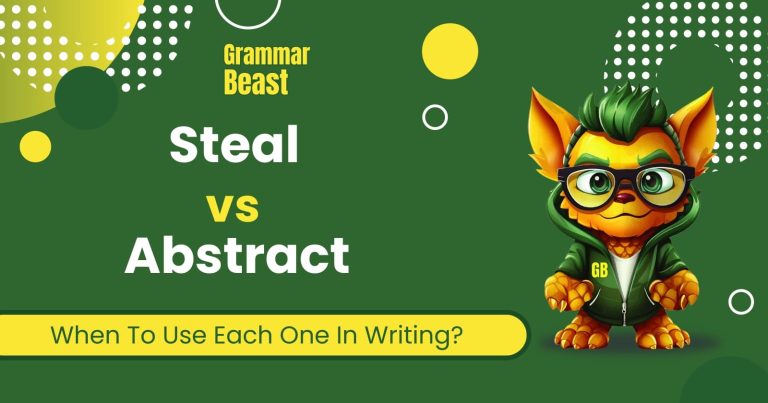

Stealing and abstracting are two concepts that may seem similar at first glance, but they have distinct meanings and implications. Steal is the proper word when referring to taking something without permission or unlawfully. Abstract, on the other hand, means to extract or summarize the essential qualities of something without representing it in a concrete form.
In this article, we will delve deeper into the differences between stealing and abstracting, exploring their definitions, implications, and applications in various contexts.
Define steal: Steal is the act of taking something without permission or legal right, typically without the knowledge or consent of the owner. It involves the unauthorized removal of property or ideas with the intention of gaining an unfair advantage or benefit.
Define abstract: Abstract refers to the concept of extracting or summarizing the essential qualities or characteristics of something, often in a simplified or symbolic form. It involves the process of distilling complex information or ideas into a more generalized representation that captures the core essence of the original content.
Understanding the correct usage of words is essential for effective communication. In this section, we will explore how to use the words “steal” and “abstract” in a sentence with precision and clarity.
When using the word “steal” in a sentence, it is important to convey the act of taking something without permission or unlawfully. Here are some examples of how to use “steal” in a sentence:
On the other hand, “abstract” is used to describe something that is conceptual or theoretical rather than concrete or tangible. Here are some examples of how to use “abstract” in a sentence:
A deeper understanding of the differences between “steal” and “abstract” can be gained by examining how these words are used in various contexts. Below are examples of sentences that illustrate the correct usage of each word.
When it comes to the English language, it is crucial to use words correctly to convey the intended meaning. One common mistake that many individuals make is using “steal” and “abstract” interchangeably. Let’s delve into why this error occurs and why it is important to distinguish between these two words.
One of the most prevalent mistakes is using “steal” when “abstract” should be used instead. This confusion often arises due to a misunderstanding of the definitions of these two words.
Steal, a verb, means to take something without permission or legal right and without intending to return it. It is typically used in the context of theft or dishonesty.
For example, saying “She stole his idea” implies that she took credit for his intellectual property without his consent.
On the other hand, “abstract,” as a verb, means to consider something theoretically or separately from something else. It is often used in the context of ideas or concepts that are not tangible.
For instance, saying “He abstracted the main points from the article” suggests that he extracted the key ideas or concepts from the text.
It is essential to differentiate between these two words to ensure clear and precise communication. Using “steal” when “abstract” is the appropriate term can lead to confusion and misinterpretation.
Understanding the distinctions between “steal” and “abstract” is crucial for effective communication. Using these words interchangeably can result in misunderstandings and misrepresentations of the intended message.
By avoiding these common mistakes, individuals can enhance their writing and speaking skills, conveying their thoughts accurately and effectively.
When deciding between using the words “steal” and “abstract” in your writing, it’s crucial to consider the context in which they are being used. The choice between these two words can greatly impact the tone and meaning of your message.
Here are some brief examples of different contexts and how the choice between “steal” and “abstract” might change:
While the rules for using steal and abstract are generally straightforward, there are a few key exceptions worth noting. In certain cases, the traditional guidelines may not apply, leading to some confusion for writers. Below, we will explore a few key exceptions and provide brief explanations and examples for each case.
One key exception to the rule of using steal is when it is used in a non-literal sense to mean to take credit for someone else’s work or ideas. In this context, steal is often used figuratively to describe plagiarism or intellectual theft. For example, “She tried to steal my idea and present it as her own.”
Similarly, an exception to the rule of using abstract is when it is used as a verb to mean to consider something theoretically or theoretically. In this sense, abstract is used to describe the act of extracting or removing something from a larger whole. For instance, “The artist abstracted the essence of the landscape in his painting.”
The debate between stealing and abstracting content is a complex one that requires careful consideration. While stealing content is unethical and can lead to legal consequences, abstracting content can be a valuable tool for creating original work. It is important for content creators to understand the difference between these two practices and to always strive for ethical and original content creation.

R.J. is the new owner of GrammarBeast.com. Having worked in bookstores, libraries, and more, his passion for grammar and writing are pivotal. As a ghostwriter for books that have sold tens of thousands of copies, he wants to help others find the right words and understand the differences.